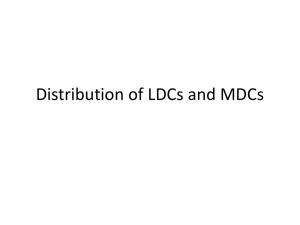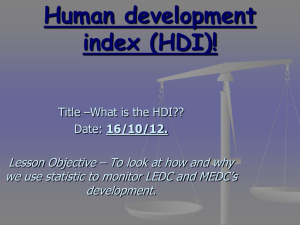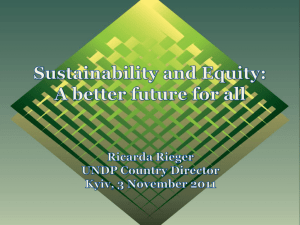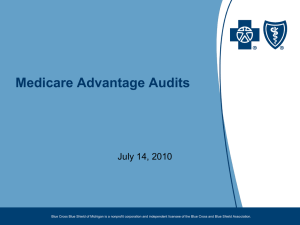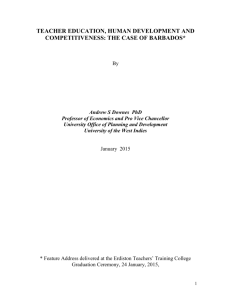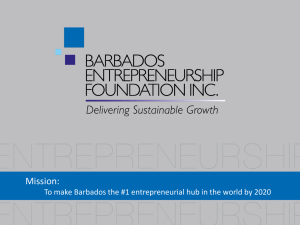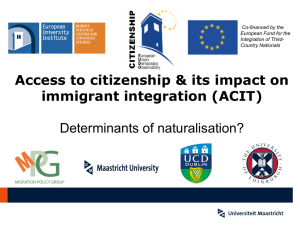HDR2013 PowerPoint Presentation with Notes
advertisement
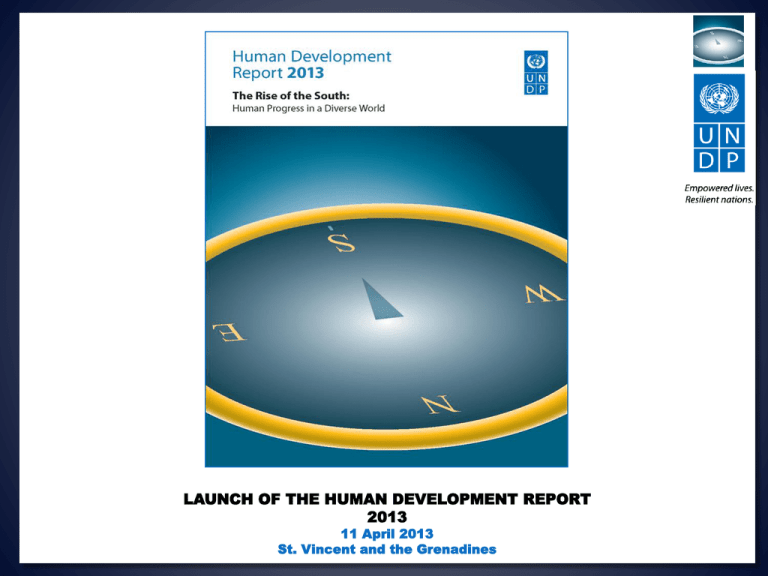
LAUNCH OF THE HUMAN DEVELOPMENT REPORT 2013 11 April 2013 St. Vincent and the Grenadines CONTENTS • • • • The rise of the South Drivers of development transformation Sustaining the momentum Opportunities and priorities for a New Era • A closer look at Barbados RISE OF THE SOUTH: • GLOBAL REBALANCING • EXPANSION OF HUMAN CAPABILITIES AND CHOICES GLOBAL REBALANCING 60 % Share of world output (PPP) 50 40 30 20 10 0 1820 1845 1870 Brazil, India, China 1895 1920 1945 1970 1995 2050 Germany, France, Italy, UK, US, Canada REALIGNMENT OF WORLD TRADE % share of world merchandise trade 60 50 40 South-South 30 North-North 20 10 0 1980 1985 1990 1995 2000 2005 2010 RAPID HUMAN DEVELOPMENT ACROSS THE GLOBE 1 Korea, Rep. Chile Brazil Mexico Malaysia Mauritius Thailand Turkey Tunisia China Indonesia Viet Nam Ghana India Lao PDR Bangladesh Uganda Rwanda HDI 2012 0.8 0.6 0.4 0.2 0 0 0.2 0.4 0.6 HDI 1990 0.8 1 MUCH HUMAN PROGRESS, PARTICULARLY IN LOW HDI COUNTRIES Avg. Annual Growth rate 2000-12 HDI Spread– highest vs. lowest 1 1.80 1.60 Norway 0.9 1.40 Bahrain 0.8 1.20 Croatia Tonga 0.7 1.00 Tunisia 0.80 0.6 Congo 0.60 0.5 Swaziland 0.40 0.4 0.20 Niger 0.3 0.00 Very high HDI High HDI Medium HDI Low HDI Very high HDI High HDI Medium HDI Low HDI MASSIVE EXPANSION OF THE GLOBAL MIDDLE CLASS 2010 (1.8 billion) 2020 (3.2 billion) 2030 (4.9 billion) Europe and North America Asia-Pacific Central and South America Rest of the World INTERNET CONNECTIVITY 1800 Internet users (millions) 1600 1400 1200 1000 800 600 400 200 0 1990 1992 1994 1996 1998 2000 2002 2004 2006 2008 2010 South North Why have some countries done better than others? What can we learn from them? What are the common drivers? Proactive development states Tapping global markets Social policy innovation PROACTIVE DEVELOPMENTAL STATES 1 3 Commitment to long-term human development Enhancing public investment in health and education 2 Actively promoting 4 Nurturing industrial job creation capacities TAPPING GLOBAL MARKETS 1 3 Investment in people to make the best of trade opportunities 2 Expanding into non- traditional markets Investing in infrastructure to facilitate market access SOCIAL POLICY INNOVATIONS 1 4 TURKEY Health care for all and targeting the poor 3 2 MEXICO BRAZIL Expanding education access by equalizing funds across regions and municipalities Poverty reduction through innovative cash transfer programmes ETHIOPIA Productive Safety Nets Programme for food security and infrastructure investment 5 JAMAICA PATH: Impact on children’s health and school attendance How can we sustain human development for the generations to come? Challenges Enhancing equity Promoting voice and accountability Confronting environmental challenges Aligning demography to policy PROMOTING EQUITY, VOICE AND ACCOUNTABILITY 1 3 Countries with less inequality do better and improve more in human development Educated, interconnected youth demand greater accountability 2 4 Equitable, quality education are essential to reduce gender inequality and promote human development Participation and inclusion essential to stability and social cohesion CONFRONTING ENVIRONMENTAL CHALLENGES COST OF INACTION: POTENTIAL ENVIRONMENTAL IMPACT ON POVERTY ALIGNING DEMOGRAPHY TO POLICY 1 3 Analysing investment 2 according to population Skills formation and productivity gains can help cope with a rapidly aging population To reap a demographic dividend and benefit from youth bulge, job creation should have priority THE RISE OF THE SOUTH: OPPORTUNITIES Governance for a changed world New development partnerships REDESIGN FOR A NEW ERA 1 3 COHERENT PLURALISM Rise in regional institutions and finance mechanisms 2 GLOBAL GOVERNANCE For fair representation and shared responsibility, 20th century institutions must adapt to 21st century realities MORE SPACE FOR NON STATE ACTORS Citizen networks and social media can promote new norms to reinforce accountability of both state and private actors NEW INSTITUTIONS, NEW MECHANISMS • Infrastructure development banks • New institutions can facilitate regional integration and SouthSouth relationships • A new South Commission $6.84 trillion $3.36 trillion PRIORITIES FOR A NEW ERA • Rising economic strength must be matched by a full commitment to human development • LDCs can learn and benefit from the success of emerging economies • Partnerships and institutions to facilitate South-south cooperation • Greater representation for the South and CSOs can accelerate progress on major global challenges • In a more connected world, the South continues to need the North and the North now needs the South as well A CLOSER LOOK AT BARBADOS HDI RANKINGS HDI Rank HDI Value 30 0.84 0.825 0.82 40 0.80 0.78 HDI Rank 50 0.76 0.760 60 0.745 0.745 0.74 0.733 0.725 70 0.72 0.70 80 0.68 90 Saint Kitts and Nevis 0.66 Barbados Grenada Antigua and Barbuda HDI Rank 38 63 67 72 72 83 88 HDI Value 0.825 0.770 0.760 0.745 0.745 0.733 0.725 Countries Dominica Saint Vincent & the Grenadines Saint Lucia HDI Value 0.770 BARBADOS HDI GROWTH TRENDS 0.9 0.85 0.79 0.8 0.798 0.797 0.808 0.809 0.821 0.823 0.824 0.825 0.76 0.75 0.706 0.7 0.65 Barbados 0.6 Barbados HDI Trend Line 0.55 0.5 0.45 0.4 1980 1985 1990 1995 2000 2005 2006 Years 2007 2008 2009 2010 2011 2012 BARBADOS Figure 1: Trends in Barbados’s HDI component indices 1980-2012 Poverty: 15.0 Indigence 6.9% (Household) Gini Coefficient: 0.47 (SLC 2010) HUMAN DEVELOPMENT IN THE OECS BARBADOS & REGIONAL HDI GROWTH TRENDS 0.9 0.85 0.79 0.8 0.798 0.797 0.808 0.809 0.821 0.823 0.824 0.825 0.76 0.75 0.708 0.706 0.7 0.715 0.722 0.729 0.73 0.736 0.739 0.741 0.683 Barbados 0.653 0.65 Latin America and the Caribbean World 0.623 0.6 0.6 0.574 Barbados HDI Trend Line 0.55 Latin America and Caribbean HDI Trend Line 0.5 0.45 0.4 1980 1985 1990 1995 2000 2005 2006 Years 2007 2008 2009 2010 2011 2012 BARBADOS AND MAURITIUS: COMMONALITIES IN DEVELOPMENT PATH Very high human development: Barbados, Chile, Argentina FOREIGN DIRECT INVESTMENT, NET INFLOWS (% OF GDP) 18 16.3 16 14 13.2 % of GDP 12 11.6 10 8 Foreign direct Investment 6 4 2 0 0.3 1980 0.4 1985 0.7 1990 0.8 2000 2007 2009 2010 YOUTH AND INNOVATION Internet users (per 100 people) 80 70 66.5 68.7 70 63 60 56.1 50 40 Internet users (per 100 people) 30 20 10 4 0 2000 2005 2006 2008 2009 2010 DEMOGRAPHIC TRENDS DRIVERS FOR DEVELOPMENT Drivers in the region Barbados Proactive states: job creation and nurturing industrial capacity Niche markets Role of innovation and technology Expansion/diversification foreign exchange base Tapping global markets: aligning investment in people with investment in infrastructure for increased market access and non-traditional sectors Integration into the global economy according to national circumstances – this is critical for small economies Foreign Direct Investments Establishment of links to the global network Social policy innovation for addressing structural inequality and enabling social mobility Education - accessible, well invested, constant revision and improvement on public education policy Health – accessible South-South Cooperation (Learn, showcase achievements) Equity, voice & accountability Investments in youth Demographic evidence for policymaking Beyond education access as a measure of gender equality Youth participation and action The engagement of civil society Youth Aging population Information and monitoring of demographic trends Policy design and implementation Climate change Innovation and technology (youth, energy and environment) Innovation, resilience approach to development Voice and advocacy in international arena Green planning Voice in international forums Adaptation and preservation OPPORTUNITIES: AN IDEAL TIME TO TALK NEW PARTNERSHIPS • Post-2015 • SIDS 2014 • Opportunity to assess partnerships and institutions GOING FORWARD… • Innovations in the South in areas such as social protection, renewable energy and climate-friendly technologies hold solutions that can be shared and used for the benefit of all • Within this region alone, with Barbados maintaining its presence in the very high human development category and with all six OECS countries in the high human development group, there are successes right here at home that can provide lessons to be shared. There are many opportunities, a need to innovate and think differently, to explore new options. No one has a monopoly on good ideas – we need to open up to new thinking, test, measure, innovate and accelerate.
